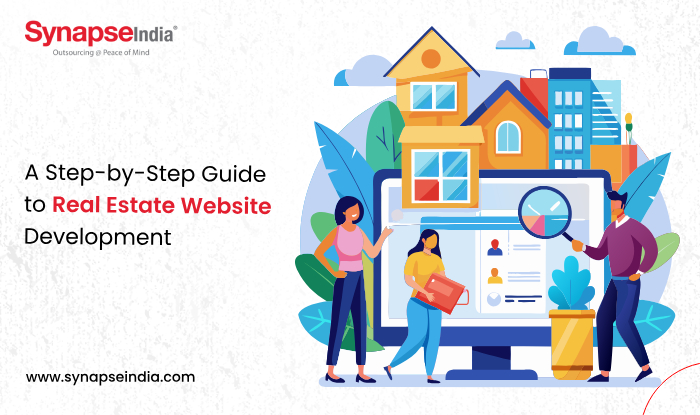 16 Oct 2024
16 Oct 2024“Looking to develop a real estate website? This comprehensive guide takes you through every step, from design to launch. Learn how to build a powerful online platform that attracts clients, Key features, and boosts your real estate business in today’s competitive market.”

With everything becoming increasingly digital, the real estate industry is experiencing a transformative shift in the way it handles business. A well-designed website has become a necessity for real estate businesses, providing them with a more efficient way to reach their target audience.
In order to adapt to the shifting landscape of the real estate market, the importance of an innovative website cannot be ignored. It acts like a platform where buyers, sellers, and agents can connect with each other for a seamless interaction and transaction. With a professional real estate website development service, your business too can get an intuitive website and conduct business efficiently and effortlessly.

Having a digital presence via an online website can help real estate companies build brand credibility and foster trust among potential clients. In this changing scenario, real estate website development has become crucial for the success of a real estate company.
By combining aesthetics with functionality, an expert real estate website development service can help you create an informative and visually appealing website that will attract more business and drive success for real estate companies. Moreover, it can also prioritize user experience, incorporating easy navigation, advanced search features, and responsive design to ensure accessibility across devices.
As the market evolves, so do the technologies that support real estate website development. From incorporating artificial intelligence for personalized recommendations to leveraging blockchain for secure transactions, innovation is at the forefront of creating a competitive edge.
If you are seeking real estate website development, understanding the key features will allow you to create a rich and user-friendly website for your business. Check out some important features that you must incorporate while designing a real estate website for yourself.
An organized, user-friendly layout ensures that visitors can navigate the site easily. Clear menus, categorized listings, and a responsive design make the browsing experience smooth across all devices.
Having robust search functionality in your real estate website is paramount. An advanced property search will allow users to filter listings by criteria such as location, price, size, and amenities, ensuring they find properties that match their specific needs effortlessly.
Provide stunning, high-resolution images and videos on your website to attract the interest of your potential buyers. Further, by offering the facility for virtual tours, you can allow website visitors to explore properties from the comfort of their homes, enhancing their experience.
Incorporating information about the neighborhood amenities such as schools, hospitals, etc. helps users make informed decisions. Moreover, interactive maps can enhance this feature, offering a visual representation of these amenities.
A dedicated section for informative articles, tips, and market analyses not only positions the website as a valuable resource but also boosts SEO , attracting more organic traffic.
Through social media integration, you can promote listings on social platforms, increasing visibility and engagement. Integration with the CRM systems is also important to help agents manage leads, track interactions, and streamline follow-ups.
By developing a professional website, real estate companies can unlock numerous opportunities, positioning themselves for success in a competitive marketplace. A full-fledged real website brings multiple advantages for your business, some of which are discussed below.
A real estate website can help you reach a broader audience as it is not bound by time or location. Any potential buyer located anywhere can search your listed properties anytime from their phone or laptop. In addition to reach, it also enhances your visibility through effective search engine optimization.
Your business gets round-the-clock accessibility with a real estate website . This constant availability enhances user experience and ensures that you never miss an opportunity, whether it’s a late-night inquiry or an early morning property search.
On your real estate website, you can showcase your extensive catalog of properties, with high-quality images, detailed descriptions, and essential information. Potential buyers can easily filter listings based on their criteria such as location, price, size, and amenities. This helps make the search process efficient and user-friendly and also keeps users.
A website allows you to feature client testimonials, agent profiles, and case studies, providing social proof of your expertise and reliability. When users see evidence of past successes and positive experiences, they’re more likely to engage with you and consider your services. Thus, a professional website enhances your credibility and instills trust in potential clients.
There are different ways a real estate website can enhance the user experience. Features such as virtual tours, mortgage calculators, and interactive maps provide clients with essential information and allow them to visualize properties better.
Investing in a real estate website is a cost-effective marketing strategy compared to traditional advertising methods. With analytics tools, you can track user behavior and marketing effectiveness, allowing you to adjust strategies in real time for maximum impact.
Looking forward to designing a functional real estate website but don’t know where to start? Developing a real estate website involves careful planning and execution. Here is a step-by-step guide for real estate website development to help you through the process.
By following these steps, you can create a robust real estate website that meets your business objectives and serves your clients effectively. If the development process still feels complicated, you can always seek help from a professional real estate website development agency.
Start the process by deciding the purpose of your website. Whether you are focusing on property listings, or lead generation, or want to showcase your services, having clear goals from the beginning is important to guide your design and functionality decisions.
Select a domain name that reflects your brand and is also easy to spell and remember. Choose a reliable hosting provider that offers scalability, security, and good customer support.
Design a clean, intuitive layout with easy navigation supported by clear menus, search filters, and well-organized property listings. Develop wireframes and prototypes to visualize your website.
Start the development based on the design. Create frontend, backend and database architecture. Implement APIs for connectivity between backend and frontend and also implement robust security features to safeguard your website.
Before going live, conduct thorough testing to identify and fix any issues. Test your website for functionality, responsiveness, performance and loading speed. Once testing is complete and any issues found are fixed, proceed with the launch of your website.
After launch, continuously monitor site performance using analytics tools. Regularly update content, optimize for SEO, and refresh property listings to keep users engaged.
Leveraging the right technologies when developing a real estate website can significantly enhance functionality, user experience, and performance. Here are some top technologies to consider:
Developing a real estate website comes with its own set of unique challenges that can impact the project's success. Addressing these challenges with careful planning can lead to a successful real estate website that effectively serves users.
One of the biggest hurdles is managing a vast number of property listings. Creating a system that allows for easy updates and accurate data integration from MLS feeds can be intricate and time-consuming.
Balancing aesthetics and functionality are crucial. A visually appealing design must also ensure easy navigation, which can be challenging when catering to diverse user preferences.
With an increasing number of users accessing websites via mobile devices, ensuring that the site is fully responsive is essential. This requires additional design considerations and testing to maintain performance across platforms.
Features like virtual tours, mortgage calculators, and chatbots enhance user engagement but can complicate development. Ensuring these tools work seamlessly with the website requires technical expertise.
Safeguarding user data, particularly during transactions, is vital. Implementing robust security measures adds another layer of complexity to the development process.
Choosing the right real estate website development company is crucial for your online success. Here are some tips to guide your decision.
The cost of developing a real estate website can vary significantly based on several factors. A basic site offering essential features like property listings and search functions might cost less than a website incorporated with advanced features like virtual tours,CRM integration , and custom design. Ongoing expenses for hosting, maintenance, and updates should also be considered, adding another layer to the investment. If you are hiring developers, their expertise and location will also affect the cost of your real estate website.
To get an estimate of the real estate website development cost, it is better to directly ask your development partner. It is recommended to discuss the pricing during the initial stage of the development process, i.e., planning the budget and timeline of your project. Even if it costs initially to get a custom real estate website developed for your business, it can yield substantial returns by attracting and converting potential clients in a competitive market.
In 2024, several key trends will shape how properties are showcased and how users interact with real estate platforms. By embracing these trends, real estate websites will not only enhance user experience but also stand out in a competitive market, driving engagement and ultimately boosting sales.
Clean, minimalist designs offer a sense of simplicity blended perfectly with elegance. Clear typography and streamlined navigation are the recent trends that allow users to engage with listings without distractions.
Websites are increasingly incorporating interactive features like 3D virtual tours and augmented reality, allowing potential buyers to explore properties remotely. This immersive technology enhances user engagement and helps clients visualize spaces more effectively.
Leveraging AI-driven algorithms, real estate websites will offer personalized property recommendations based on user behavior and preferences. This tailored approach not only improves user experience but also increases the likelihood of conversion.
With growing environmental consciousness, websites will increasingly feature eco-friendly designs and highlight sustainable properties. This trend specifically appeals to environmentally aware buyers.

As mobile browsing continues to dominate, a responsive design has become crucial. Real estate websites now prioritize mobile optimization, ensuring that listings, images, and functionalities work seamlessly across all devices.
Building a real estate website requires careful planning and a solid understanding of key features, familiarization with top technologies, staying updated with trends and much more. By focusing on these essential aspects, a real estate development agency can create a successful website that attracts users, provides value, and helps businesses grow in the competitive real estate market.


